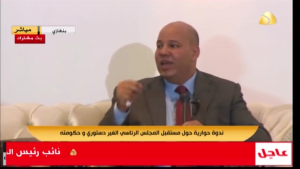By Sami Zaptia.

London, 19 July 2018:
Presidency Council and Government of National Accord (PC/GNA) member Fathi Majbari (Majbri) has announced the ‘‘suspension’’ of his membership from these two internationally recognized bodies. The PC/GNA were created by the Libyan Political Agreement signed in the Moroccan city of Skhirat in December 2015.
In a live televised announcement from Benghazi on the eastern (and pro-Hafter)-based Al-Hadath TV yesterday, Majbari, who is one of the representatives of Libya’s eastern region on the PC and GNA, said he will no longer work from Tripoli which was ‘‘under the control of militias’’.
Taking part in a 1 hour and 40-minute discussion programme together with 7 eastern-based House of Representatives members, Majbri said that what was going on in Tripoli was a ‘‘play’’ (a shame or a charade).
He reiterated how three weeks ago his Tripoli home was the subject of an attack by ‘’50-armed people’’ at 4.30 am. He was forced to flee for his life to Tunis and thereon to Benghazi. His guards were hurt but he managed to quickly escape, adding that ‘‘the large number of attackers suggests they wanted to kill, hurt or kidnap me’’.
Majbri said that the ‘‘cartel of armed Tripoli militias dominate the security situation’’ in the capital. These armed militias have ‘‘ended the practical possibility of an independent force (the Presidential Guard) being set up in Tripoli to protect the Presidency Council’’ and its ability to ‘‘take independent decisions’’. He said that the Presidency Council was ‘‘ended in one night’’ when their weapons, vehicles, communications equipment and bases were ‘’taken over’’ by Tripoli militias. Even Faiez Serraj’s Presidency Guard protection force for his home were arrested, he added.
Majbri said that he had refused to deal with the Tripoli militias as it would have ended his independence and that as far as he was concerned, it has become clear that any decisions taken by Serraj ‘‘are affected by these militias’’.
Majbri put the cause of the militia attack on him to his attempts to reform the Libyan economy. ‘‘I was requested by Serraj to deal with the reforms which effect the interests of militias’’, he explained. ‘‘I started receiving calls and death threats about Letters of Credit and reforms’’, he claimed.
He explained that what was happening in Tripoli was a shame or charade, where people who act or portray that they have authority actually represent other powers behind them. Citing a German article, he referred to these as the ‘‘Tripoli Cartel’’.
He implied that the internationally-recognized Presidency Council and its designated (yet to be approved by Libya’s internationally-recognized parliament, the House of Representatives) Government of National Accord has no ‘’independent’’ power in Tripoli.
On Serraj he said that he ‘‘pretends’’ that he has the ability to enforce the law and to investigate crimes and acts’’ when he does not. He said the PC/GNA should ‘‘stop fooling the people’’ as it is unable to even ‘‘express itself freely’’ in Tripoli.
Majbri seemed particularly annoyed by the PC’s announcement and efforts to investigate the recent shooting at a local football match – but it was unable to investigate who had attacked his home. Tripoli militias do not want to allow even ‘‘free expression’’, he added.
He claimed that he had been able to express his opinions and take decisions previously, but that ‘‘today, the price of free expression and action is death’’. Tripoli is ‘‘no longer viable for political activity’’ by (unarmed) politicians. The political battle is unequal, he explained, as one set is armed while the other is not. He therefore, pledged that he was leaving Tripoli until this unequal political battle is resolved.
He called on all ‘‘honourable’’ people who care for Libya to withdraw from the PC/GNA in order to stop this false play so that the truth comes out. All Ministers should resign, he added.
Majbri warned that the PC/GNA was a danger not only to the rest of Libya but to Tripoli itself. He forecast that there will be an inevitable three-levelled militia struggle: one within the individual Tripoli militias, one between Tripoli militias and one with those militias forced out of Tripoli.
He reminded that in the east the LNA had fought what were much more dangerous and extremist militias.
Analysing the security situation in Libya and what was agreed in the Skhirat Libyan Political Agreement,
Majbri said, using the English terms and abbreviations, that some sort of Disarmament, Demobilization and Reintegration (DDR) of Tripoli militias was supposed to take place as part of the LPA’s Security Sector Reform (SSR) its Temporary Security Arrangements (TSA).
However, these never really progressed much, and the creation and establishment of the Presidential Guard was supposed to be the foundation of the militia reform. He said ‘‘tens of millions’’ were spent on the Presidential Guard, but that in one night it was ended by militias.
The militias’ action against the Presidential Guard means that the militias clearly understood that if security sector reforms are continued, they would lead to their demise and that this would lead to the increased authority of the state and its politicians.
The ending of the Presidential Guard Presidential Guard is a very important and dangerous development and based on what he has witnessed in Tripoli over the last six months – the ‘’militia struggle is coming to Tripoli’’. All the militias want to share in the country’s wealth from oil revenues, he explained.
Majbri criticised Ghassan Salame for his silence on the topic and noted how he gave the matter little mention in his recent UN Security Council briefing on Libya. ‘‘Where is Ghassan Salame who does not talk about what is happening in Tripoli’’, he asked.
On the claim by National Oil Corporation (NOC) chairman Mustafa Sanalla that Majbri was responsible for economic and budget policy in the PC/GNA and so the east cannot claim that they are being marginalized economically, Majbri pointed out that the armed attack on his home was to stop him speaking freely about reforms. He also pointed out that the NOC’s board was not representative of the whole of Libya in its makeup.
Majbri repeated that there will never be any real political process in Tripoli as a result of the domination of its militias. There is no ability to take ‘’independent action in Tripoli’’, adding that ‘‘you do as they say or face the guns’’. Ghassan Salame failed to say this in his recent UNSC briefing, adding that by omitting to mention this, Salame was ‘‘taking part in this fake play’’.
‘‘We must expose this play. We must take popular decisions against this and a reaction beyond my withdrawal (from the PC/GNA)’’. Stopping at his withdrawal would only leave room for others to continue their actions, he explained.
Majbri then set out the conditions for his returning to his PC/GNA roles:
- Tripoli’s security arrangements should be discussed realistically
- The removal of militias from Tripoli. Otherwise, all political actors should be allowed to have their own security forces. There cannot be one set of political actors armed whilst the others are not. If removing militias from Tripoli is not possible, the country’s government should be transferred elsewhere.
- There should be an equitable distribution of all of the country’s opportunities, resources and inputs into policy format – for all Libyans. This does not exist now for all Libyans, he added.
- There should be a realistic of a unitary Libyan government that is fair and equitable. He explained that the Tripoli status quo are not interested in this and therefore they resort to the ‘‘fantasy’’ option of elections in order to avoid real political reforms.
We must stop fooling the people. We need to reform legislation away from the inherited pre-2011 centralist system, he explained.
‘‘Militias will never allow Libyans to have stability in their country. There is a contradiction between what Libyans want and what the militias want. For the first time in Libya’s history power is now concentrated in 4 to 5 people. Those who now control Tripoli are the real enemies of all Libyans. As long as there is a reluctance to deal with militias as an institution, Libya will not progress or be stable’’, concluded Majbri.
https://www.libyaherald.com/2018/07/06/serraj-confirms-and-condemns-tripoli-attack-on-pc-member-majbari/
https://www.libyaherald.com/2016/02/13/new-gatrani-and-majberi-presidency-council-walkout-leaves-unity-government-selection-in-disarray-serraj-cancels-visit-to-munich/
https://www.libyaherald.com/2016/11/14/majbri-says-serraj-acted-illegally-in-ordering-embassy-staff-reductions/
https://www.libyaherald.com/2017/01/04/serraj-cancels-all-unilateral-majabri-appointments-insists-pc-has-not-failed/
https://www.libyaherald.com/2017/08/05/majbri-condemns-serraj-over-italian-intrusion/
https://www.libyaherald.com/2017/09/03/former-pc-loyalist-majbri-joins-gatrani-and-aswad-in-fresh-challenge-to-serraj/
https://www.libyaherald.com/2018/07/17/second-batch-of-presidential-guard-cadets-graduate/
https://www.libyaherald.com/2015/12/17/government-of-national-accord-deal-signed-in-skirhat/
https://www.libyaherald.com/2018/07/17/end-of-2018-libyan-elections-should-only-be-held-if-conditions-are-right-salame-to-unsc/










